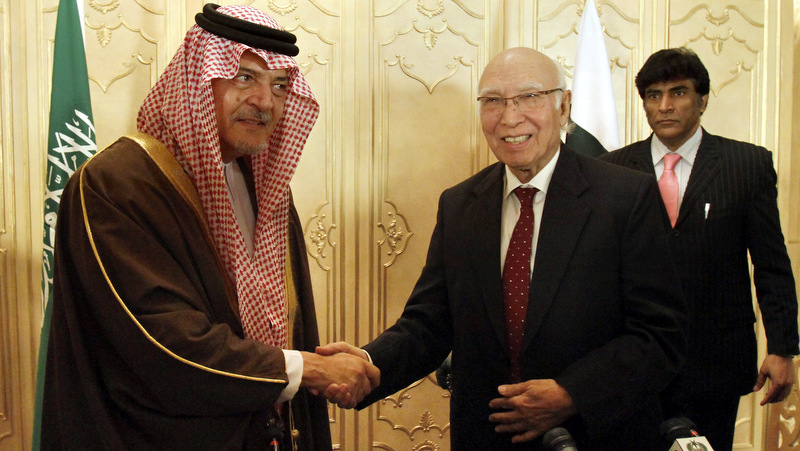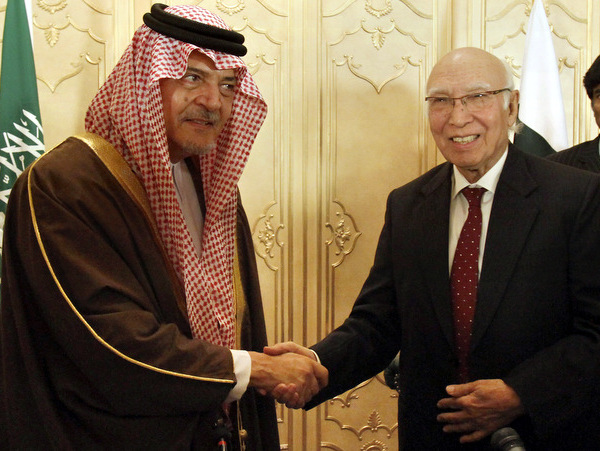
KARACHI, Pakistan — The struggling State Bank of Pakistan got a shot in the arm early this month when it received a purported “gift” of $1.5 billion from Saudi Arabia.
This was not the first time such a gift has arrived. In fact, Riyadh has been a consistent benefactor to Islamabad. Retracing history, political analyst Dr. Hassan Askari Rizvi told MintPress News that in the early 1970s, Pakistan received “financial donations, loans and investment from several Arab countries, especially Saudi Arabia, Kuwait and Libya.”
But concerns over the funds are focused less on the amount and more on the secrecy and the timing surrounding it.
What has made this unprecedented generous gift suspect was the government’s initial refusal to disclose the name of the patron. It was only after the media got a whiff of the benefactor and revealed that the bulk of the money had come from Saudi Arabia, propped up with smaller donations from the Gulf countries, that the government reluctantly conceded.
“What will Pakistan have to do in return and what’s the price tag attached to this gift?” Zahid Hussain, a contributor to Pakistan’s English-language daily Dawn and political analyst, asked while speaking to MintPress.
Fending off these and other awkward questions, Ishaq Dar, Pakistan’s finance minister, said at a recent press conference that the money should not be turned into a contentious issue, but accepted graciously as “friendly assistance.”
While the Pakistani rupee’s sudden recovery against the dollar from 105.40 to 97.40 between March 4 to 12 has met with applause, in the face of significant international debt payments and rising inflation, experts worry that the Saudi’s largesse comes with strings attached.
The Shiite-Sunni stand-off
More of a concern is the trouble brewing in the Middle East, as the Sunni-majority Saudi Arabia vies for power with Shiite-majority Iran.
For instance, experts note the case of the pro-economic and political freedom protests that began in Syria in March 2011 and quickly turned into a civil war. This, too, should be viewed through the prism of a Shiite-Sunni stand-off, with the Sunni majority against the Alawite minority. It has drawn in regional powers, with Shiite Iran backing President Bashar al-Assad and Sunni Gulf Arab states and Sunni Turkey helping the rebels.
There are real fears it may engulf the Middle Eastern countries split between Sunnis and Shiites. Neighboring Iraq is already feeling the heat. More than 700 civilians were killed in Iraq in February. Since December, fierce clashes between the government security forces and tribal Sunni militia supported by al-Qaida and other insurgent groups have been taking place regularly in Sunni strongholds, located in northern Iraq.
Bahrain, too, remains deeply divided three years after the Sunni-ruled kingdom tried to quash the Shiite majority uprising.
Currently, Saudis are worried about the United States softening it stance on Iran, with whom its relationship is downright vitriolic. The signs of the strain in the relationship between the U.S. and Saudi Arabia are also obvious. The Saudis wanted Syrian President Bashar al-Assad ousted and Iran’s role diminished, and were deeply disappointed at Washington’s reluctance to get involved in Syria militarily after Russia offered to dispose of Syria’s chemical arsenal stockpile.
Washington’s desertion of Egypt’s Hosni Mubarak when the Arab Spring overthrew the president in 2011 has also brought home the truth that the U.S. was, after all, only a fair weather friend. With shale gas contributing to the United States’ energy self-sufficiency, it has announced a “rebalancing” of its military focus from the Middle East to the Asia-Pacific region.
Lavishing attention on Pakistan
And thus, the attention of the Arab kingdoms has turned to Pakistan.
“Pakistan’s defense industry is far stronger and developed than any Arab country. The latter may need its manpower in days to come, and then it’s the only Muslim nuclear country,” Hussain, the journalist, pointed out.
Amid the turmoil that exists in the Middle East, Pakistan is being asked to take sides — something experts say is a very worrying sign of times to come.
Hussain noted the definite U-turn Pakistan has taken from its policy of non-interference in Arab disputes, especially in the case of Syria, since the Saudi Crown Prince Salman bin Abdul Aziz al-Saud’s visit last month, when the two countries issued a joint declaration calling for a formation of a “transitional governing body” in Damascus.
Close on the heels of the Saudis, King of Bahrain Hamad bin Isa Al Khalifa visited Pakistan from March 18 to 20, further heightening speculation.
Rizvi, the political analyst, said the current interests of Saudi Arabia, Bahrain and Qatar have to be viewed in the context of an increased struggle for power and influence in the Middle East and the Gulf region.
“The Arab states are building support for them. Given the earlier connections between Pakistan and these states, they are showing more interest in Pakistan than ever. Knowing Pakistan’s interests in building its economy and seeking jobs for Pakistanis in these states, the conservative Arabs are coming forward on these counts to entice Pakistan and rope it in their regional agendas,” he explained.
The uneasiness of long-term defense observers were further exacerbated after Sartaj Aziz, Pakistani Prime Minister Nawaz Sharif’s adviser on national security and foreign affairs, confirmed the purchase of weapons by Saudi Arabia.
“Pakistan’s security cooperation with Saudi Arabia and Jordan goes back to the Ayub Khan’s era, mid-1960 onwards. In addition to these two countries, Pakistan had military missions for training purposes in most Gulf states in the 1970s. In Saudi Arabia, Pakistan’s army has been on internal security duty in the past, especially after Iraq invaded and captured Kuwait in August 1990,” Rizvi said.
Things are different this time, and they may have “serious repercussions for Pakistan’ internal security,” Hussain noted. His concern is that because the conflicts in the Middle East have a definite sectarian hue, they could threaten to inflame simmering tensions in Pakistan.
“It will be at a major loss in the long run,” Rizvi agreed, adding that Pakistan will have to tread its path carefully.
Proxy wars in Pakistan
If Pakistan takes a “clear and explicit side” in the Arab conflict, the consequences at home could be “devastating,” said Michael Kugelman, the South Asia associate at the Woodrow Wilson International Center for Scholars in Washington, D.C.
“At least Pakistan would have fewer military resources at home to fight ongoing internal security threats that will remain in play,” he pointed out to MintPress, referring to the cease-fire between the government and the Taliban.
Kugelman further warned that the country, which is “already a battleground for a Saudi-Iranian proxy war,” could see an increase in sectarian strife.
“Only this time, it would have to worry about Iranian fighters and arms being shipped into Pakistan and used to counteract Pakistan’s vicious Sunni extremist movements,” he emphasized.
Still, the most troubling thought, Kugelman said, is that “by plunging into a global sectarian battle, yet another distraction would prevent policymakers from acting on the country’s many pressing problems — from energy and water crises, to food inflation and, of course, withering levels of militant violence.”
“It needs to make sure that these states do not use the new closeness to increase their influence through money in Islamic denominational groups in Pakistan which will increase sectarianism and intensify internal divisions in an already fragmented Pakistani society,” Rizvi said.
Though Sharif has denied these speculations, doubts persist due to the “gifts” and “friendly assistance” showered on Pakistan recently.


